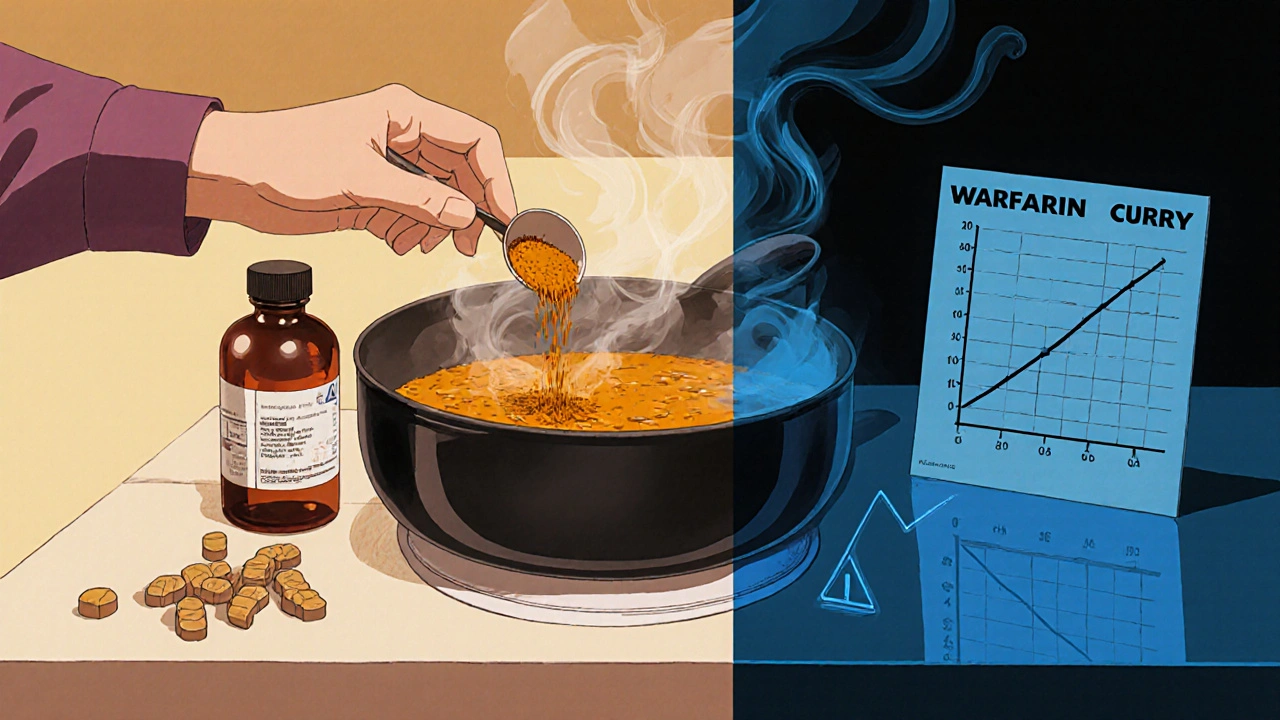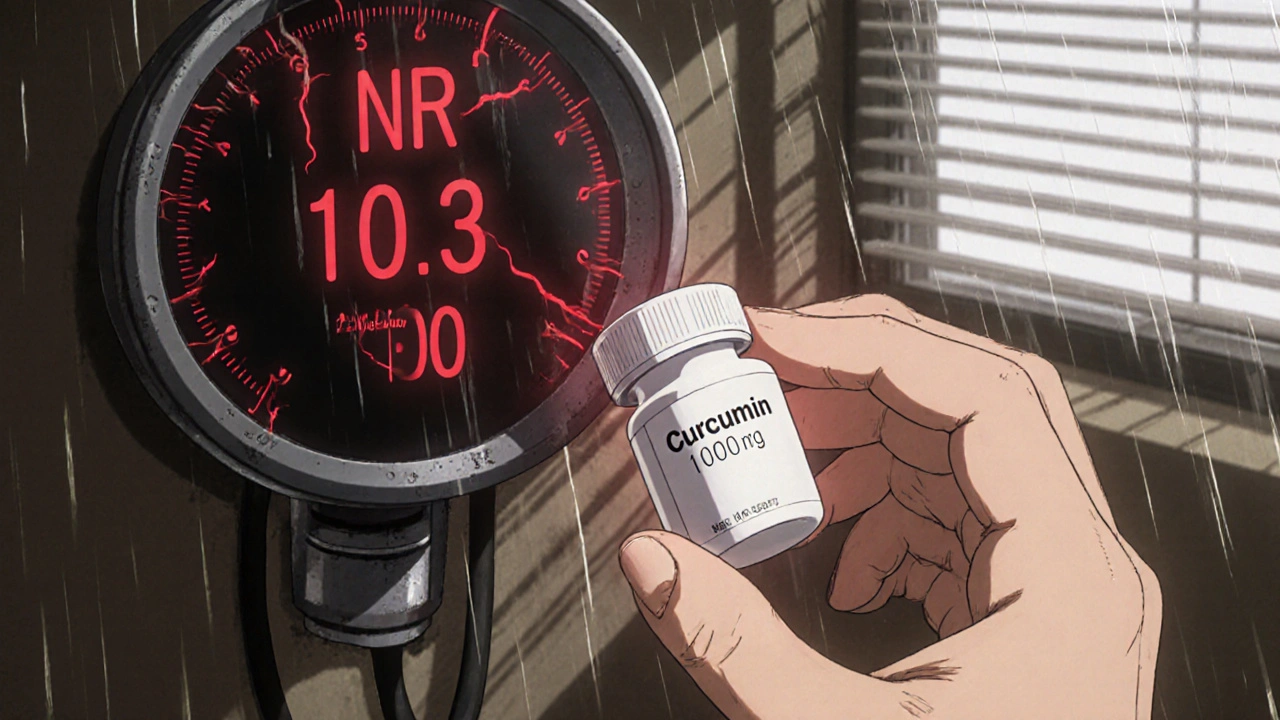Many people take turmeric for its anti-inflammatory benefits, believing it’s just a harmless spice. But if you’re on a blood thinner-whether it’s warfarin, aspirin, clopidogrel, or a DOAC like rivaroxaban-turmeric isn’t just harmless. It’s a potential danger. The evidence isn’t speculative. It’s documented in medical journals, confirmed by health agencies, and backed by real patient cases where people ended up in the hospital because they didn’t know the risk.
How Turmeric Acts Like a Blood Thinner
Turmeric’s main active compound, curcumin, doesn’t just give curry its color. It actively interferes with how your blood clots. Studies show curcumin slows down key steps in the clotting process. It inhibits thrombin and factor Xa-two proteins your body needs to form clots. It also reduces platelet aggregation, meaning your blood cells are less likely to stick together when they should. This isn’t a mild effect. A 2012 study published in PubMed found that curcumin prolonged two important clotting tests: activated partial thromboplastin time (aPTT) and prothrombin time (PT). These are the same tests doctors use to monitor warfarin therapy. When these times go up, your blood takes longer to clot. That’s good if you’re trying to prevent a stroke. It’s dangerous if you cut yourself or have an internal bleed. Curcumin’s effect is dose-dependent. The more you take, the stronger the effect. But here’s the problem: there’s no standard dose. A teaspoon of ground turmeric in your soup might be fine. A supplement labeled “1,000 mg of curcumin” could contain 95% pure curcumin extract. That’s like comparing a drop of water to a full glass. The supplement isn’t just “natural”-it’s concentrated. And that’s where the risk spikes.Real Cases: When Turmeric Almost Killed Someone
In April 2018, Medsafe in New Zealand issued a formal warning after a patient on stable warfarin therapy started taking a turmeric supplement. Their INR-measured to track how thin their blood was-shot from a safe level to over 10. The therapeutic range for warfarin is 2 to 3.5. An INR above 5 is already considered dangerous. An INR over 10 means uncontrolled bleeding. This patient didn’t just have a nosebleed. They were at high risk of brain hemorrhage, internal bleeding, or death. Another case involved a kidney transplant patient. They were taking tacrolimus, a drug that prevents organ rejection. To boost their health, they started consuming 15 or more spoonfuls of turmeric powder daily for ten days. Their tacrolimus levels spiked to 29 nanograms/mL-far above the safe limit. They developed acute kidney injury. Turmeric interfered with the enzyme (CYP3A4) that breaks down tacrolimus. The drug built up to toxic levels. That’s not a side effect. That’s a life-threatening drug interaction. These aren’t rare anomalies. They’re documented in official medical bulletins from health agencies in New Zealand, the UK, and Australia. The Welsh Medicines Information Centre updated their guidance in October 2024, reaffirming that turmeric can cause dangerous INR spikes in people taking warfarin. And they’re not alone. The Mayo Clinic, the British Heart Foundation, and MedicineNet all warn about this interaction.Why Warfarin Is Especially Risky
Warfarin is one of the oldest blood thinners, but it’s also one of the trickiest. It has a narrow therapeutic index. That means the difference between a dose that works and a dose that kills you is tiny. A little too much, and you bleed. A little too little, and you get a clot. Curcumin makes this worse in two ways. First, it boosts warfarin’s effect directly by slowing clotting. Second, it may block the liver enzymes that break down warfarin. This means warfarin sticks around longer in your body, building up even if you’re taking the same dose. That’s why INR can climb so fast after starting turmeric-even if you’ve been on warfarin for years without issues. The same doesn’t happen as predictably with newer drugs like rivaroxaban or apixaban. But that doesn’t mean they’re safe. The British Heart Foundation explicitly warns that high-dose turmeric supplements could interact with these too. The mechanism might be different, but the outcome is the same: increased bleeding risk.Other Medications Turmeric Can Interfere With
It’s not just blood thinners. Turmeric affects how your body processes many drugs. The Welsh Medicines Information Centre found that a 2-gram daily dose of curcumin increased sulfasalazine levels by 3.2 times. Sulfasalazine is used for inflammatory bowel disease and rheumatoid arthritis. Too much can cause liver damage or low blood cell counts. Turmeric also interferes with norfloxacin (an antibiotic), and it may lower blood sugar. If you’re on metformin or insulin, adding turmeric supplements could push your glucose too low. That’s another hidden risk. Even over-the-counter painkillers like ibuprofen, naproxen, and diclofenac can become riskier when combined with turmeric. These drugs already thin the blood a bit. Turmeric adds to that effect. The result? More bruising, more nosebleeds, more bleeding after minor injuries.
What the Experts Say
There’s no debate among medical authorities. They all agree: avoid turmeric supplements if you’re on blood thinners. Medsafe says: “Concurrent use of turmeric/curcumin containing natural health products with these medicines may result in prolonged bleeding times and should be avoided.” The Welsh Medicines Information Centre says: “Monitor closely if warfarin and curcumin are taken together, especially as warfarin has a narrow therapeutic index.” Mayo Clinic says: “Turmeric in large doses can act like a blood thinner, causing bleeding or dangerously enhancing the effects of blood-thinning medications.” Dr. Oracle’s analysis (2023) puts it bluntly: “The evidence clearly indicates that the anticoagulant properties of turmeric/curcumin create a significant risk when combined with warfarin.” Even the British Heart Foundation, which focuses on heart health, includes turmeric in its list of supplements that can interfere with anticoagulants. This isn’t fringe advice. It’s mainstream medical guidance.What About Cooking With Turmeric?
This is the most common question. If supplements are dangerous, is a little turmeric in your curry okay? The short answer: yes, probably. A teaspoon of ground turmeric in food contains only about 20-40 mg of curcumin. That’s far below the levels shown to cause problems in studies. Most case reports involve supplements, not culinary use. But even here, caution matters. If you’re on warfarin and suddenly start eating turmeric-heavy meals every day-like curry for lunch and dinner, plus turmeric lattes-it adds up. Consistent, high intake from food can still affect your INR over time. The safest approach? Keep your turmeric use in food consistent. Don’t suddenly double your intake. And always tell your doctor if you change your diet significantly.What You Should Do
If you’re on a blood thinner:- Avoid turmeric supplements entirely. That includes capsules, powders, extracts, and “curcumin boosters.”
- Don’t assume “natural” means safe. Many people think herbs are harmless. They’re not. Turmeric is a potent bioactive compound, not a flavoring.
- Stop turmeric supplements at least two weeks before any surgery. This includes dental work. Bleeding during procedures can be life-threatening.
- Always tell your doctor about every supplement you take. Even if you think it’s “just a spice.”
- Monitor your INR closely. If you’ve been taking turmeric and start bleeding more easily-bruising without reason, nosebleeds, blood in urine or stool-get tested immediately.

What If You’ve Already Been Taking Turmeric?
If you’ve been taking turmeric supplements and are on a blood thinner, don’t panic. But do act. Stop the supplement immediately. Contact your doctor or anticoagulation clinic. Ask for an INR test. If your INR is above 5, you need urgent care. Even if it’s normal, you should get retested in a few days. The effects of curcumin can linger. Keep a record of what you took, how much, and for how long. This helps your doctor assess your risk. And never start another supplement without checking with your healthcare provider first.The Bigger Problem: Lack of Awareness
About 2-3% of adults in developed countries take blood thinners. That’s millions of people. Yet most don’t know turmeric supplements can be deadly with their medication. Supplement labels rarely warn about interactions. Online articles call turmeric a “superfood.” Social media influencers promote it for “detox” and “anti-aging.” The message is: more is better. But medicine doesn’t work that way. A compound that helps in small amounts can hurt in large ones. And when you’re on a drug with a narrow window-like warfarin-there’s no room for error. The solution isn’t to ban turmeric. It’s to educate. If you’re on a blood thinner, treat turmeric like you treat alcohol or grapefruit. It’s not about morality. It’s about safety.Final Takeaway
Turmeric isn’t the enemy. But as a supplement, it’s a hidden risk for anyone on blood thinners. The science is clear. The cases are real. The warnings are official. You don’t need to give up curry. But you do need to stop taking turmeric pills, powders, and extracts. Your life might depend on it.Can I take turmeric if I’m on warfarin?
No. Turmeric, especially in supplement form, can significantly increase the blood-thinning effect of warfarin, leading to dangerously high INR levels and a high risk of severe bleeding. Even small amounts in supplements can cause this. Stick to culinary amounts in food, and always tell your doctor if you change your intake.
Is turmeric safe with newer blood thinners like rivaroxaban?
It’s not proven safe. While rivaroxaban doesn’t interact with warfarin’s metabolic pathways, turmeric still inhibits clotting through multiple mechanisms, including platelet suppression. The British Heart Foundation warns that high-dose turmeric supplements may increase bleeding risk with any anticoagulant. Until more research is done, avoid supplements.
How much turmeric is safe to eat in food?
A teaspoon of ground turmeric in cooking (about 20-40 mg curcumin) is generally considered safe for most people on blood thinners. The problem comes with concentrated supplements, which can contain 500-1,000 mg of curcumin per dose. Consistency matters-don’t suddenly start eating curry twice a day if you weren’t before.
What should I do if I’ve been taking turmeric supplements and I’m on blood thinners?
Stop the supplement immediately. Contact your doctor or anticoagulation clinic and request an INR test. Bleeding symptoms like unusual bruising, nosebleeds, blood in urine or stool, or headaches require urgent medical attention. Keep a record of how much and how long you took it to help your provider assess your risk.
Do all turmeric supplements contain the same amount of curcumin?
No. Raw turmeric powder contains only 2-8% curcumin. Supplements can contain up to 95% pure curcumin extract. That means one capsule might deliver 20 times more curcumin than a teaspoon of spice. Labels often don’t make this clear, making it hard to judge risk. Always assume supplements are potent and avoid them if you’re on blood thinners.

Leo Adi
November 27, 2025 AT 04:12Man, I never thought about turmeric like this. I’ve been adding it to my dal every day like it’s nothing. Guess I’m lucky my INR’s been stable, but I’ll cut back on the powder now. Better safe than sorry, right?
Gaurav Sharma
November 27, 2025 AT 05:15This is why people die. Not from warfarin. Not from surgery. From ‘natural’ supplements they think are harmless. Curcumin is a potent enzyme inhibitor. It’s not tea. It’s pharmacology in a capsule. Stop romanticizing spices.
archana das
November 27, 2025 AT 15:45Life is balance. A little turmeric in food? Fine. A pill with 95% curcumin? That’s like drinking pure caffeine instead of coffee. We forget that nature doesn’t care if we call something ‘natural.’ It only cares if it changes how the body works. And it does.
Sue Haskett
November 28, 2025 AT 19:28I’m so glad someone finally said this. So many people think ‘herbal’ = ‘safe.’ No. It means ‘unregulated.’ I’ve seen patients bleed out because they took ‘just a little turmeric’ while on warfarin. Please, if you’re on blood thinners, talk to your pharmacist. Not your yoga instructor.
shawn monroe
November 30, 2025 AT 07:58Curcumin inhibits CYP3A4 and CYP2C9 isoforms-major Phase I metabolizing enzymes. This directly impacts the pharmacokinetics of warfarin (S-warfarin via CYP2C9) and DOACs via P-gp efflux modulation. Supplement bioavailability enhancers (like piperine) exacerbate this. Bottom line: avoid concentrated extracts. Culinary use? Low risk. But not zero.
Lauren Zableckis
December 1, 2025 AT 22:04I’m on rivaroxaban and used to take turmeric capsules for ‘joint health.’ I stopped after reading this. I don’t want to be the person who bleeds out because I thought ‘natural’ meant ‘no side effects.’ Thanks for the clarity.
Jebari Lewis
December 3, 2025 AT 05:03As a clinical pharmacist, I’ve managed 17 cases of INR >8 due to turmeric supplements in the last 3 years. Every single patient assumed it was ‘just a spice.’ None had read the label. None knew curcumin content varied 50-fold between products. This isn’t anecdotal. It’s systemic negligence. Pharmacies need warning stickers on every turmeric bottle. And regulators need to classify curcumin as a drug ingredient, not a supplement.
There’s no such thing as ‘safe dose’ without context. A teaspoon of spice? Fine. A 500mg capsule? That’s 25x the amount in food. And you think your liver doesn’t notice? It does. Your INR does. Your bleeding time does.
Even if you’re on DOACs, don’t be complacent. Turmeric suppresses platelet aggregation independently. It’s not just about liver enzymes. It’s about the whole clotting cascade. You don’t need to be on warfarin to be in danger.
And if you’re thinking, ‘I’ve been taking it for years and nothing happened’-that’s called survivorship bias. You’re not the one who bled out. You’re the lucky one. The others? They’re in the ICU. Or the morgue.
Stop treating supplements like vitamins. They’re not. They’re bioactive compounds with pharmacological effects. And if you’re on anticoagulants, you’re playing Russian roulette with every capsule.
My advice? If you want the anti-inflammatory benefits, eat turmeric in curry. Not in pills. And if you’re going to take a supplement? Ask your doctor for a baseline INR first. And then test again 72 hours after starting.
This isn’t fearmongering. It’s pharmacology. And if you’re ignoring it, you’re not being ‘natural.’ You’re being reckless.
Tom Shepherd
December 4, 2025 AT 22:33Wait so if i eat curry every day im fine but if i take a pill im risking death? thats wild. i always thought the pill was just more of the same stuff. guess not.
Asha Jijen
December 6, 2025 AT 21:55Bro i just take turmeric for my knees and now you tell me its like a secret blood thinner? i thought it was for glowing skin and zen vibes. my bad. no more capsules. but i still want my golden milk 😅
Melania Rubio Moreno
December 8, 2025 AT 18:49lol i thought this was gonna be some conspiracy about big pharma hating turmeric. turns out it’s just science being scary. guess i’m quitting the supplements. but i’ll still sprinkle it on my eggs. because i’m not a monster.
Jauregui Goudy
December 9, 2025 AT 06:07Don’t panic. But don’t ignore this either. If you’re on blood thinners and taking turmeric supplements, stop. Now. Call your doctor. Get your INR checked. It’s not dramatic-it’s simple. Your life isn’t worth gambling over a ‘natural’ fix. You’re not lazy for listening. You’re smart.